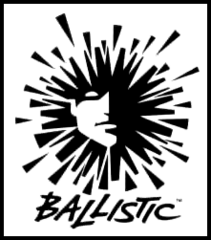Difference between revisions of "Ballistic"
From Sega Retro
m (Text replace - "Test Drive II: The Duel" to "The Duel: Test Drive II") |
|||
| (9 intermediate revisions by 4 users not shown) | |||
| Line 1: | Line 1: | ||
| − | {{ | + | {{LabelBob |
| logo=Ballistic logo.png | | logo=Ballistic logo.png | ||
| − | |||
| founded=1991? | | founded=1991? | ||
| defunct= | | defunct= | ||
| − | | | + | | company=[[Accolade]] |
| − | |||
| − | |||
| − | |||
}} | }} | ||
| − | {{stub}} | + | {{stub}}'''Ballistic''' was a publishing label created by [[Accolade]]. It was presumably created due to contractual issues with [[Nintendo]], allowing the company to publish more games for [[Sega]] systems than Nintendo would have otherwise allowed (similar to [[Acclaim]] and [[Flying Edge]]). |
| − | The Ballistic brand name was used for all of Accolade's [[Sega Mega Drive]] releases prior to the [[Sega v. Accolade]] lawsuit (bar ''[[Ishido: The Way of Stones]]''). Every Ballistic title before this period was produced without a license from Sega, and was thus manufactured independently, with games shipping on irregular cartridge designs and in multi-region cardboard boxes. Unlike Flying Edge, the Ballistic name made its way onto other systems, such as the TurboGrafx-16 port of ''Turrican'' and the SNES port of ''Test Drive II'', though was predominantly associated with the Mega Drive. | + | The Ballistic brand name was used for all of Accolade's [[Sega Mega Drive]] releases prior to the [[Sega v. Accolade]] lawsuit (bar ''[[Ishido: The Way of Stones]]''). Every Ballistic title before this period was produced without a license from Sega, and was thus manufactured independently, with games shipping on irregular cartridge designs and in multi-region cardboard boxes. Unlike Flying Edge, the Ballistic name made its way onto other systems, such as the [[TurboGrafx-16]] port of ''[[nec:Turrican|Turrican]]'' and the [[SNES]] port of ''[[The Duel: Test Drive II|Test Drive II]]'', though was predominantly associated with the Mega Drive. |
Around the time of the lawsuit, the Ballistic brand was temporarily dropped, and Accolade began to publish games it had developed for the console (still without a license) with Accolade branding (including for some re-released Ballistic titles). This continued after the lawsuit, though now Accolade were able to use official Sega branding. | Around the time of the lawsuit, the Ballistic brand was temporarily dropped, and Accolade began to publish games it had developed for the console (still without a license) with Accolade branding (including for some re-released Ballistic titles). This continued after the lawsuit, though now Accolade were able to use official Sega branding. | ||
| − | + | Accolade would cease using the Ballistic brand for its own titles in 1992, however the name would be brought back in around 1994/1995 for later Mega Drive titles in North America (typically re-releases assembled in Mexico). These versions are marked with a Ballistic sticker on the back of the box. | |
==Softography== | ==Softography== | ||
| − | + | {{CompanyHistoryAll|Ballistic}} | |
| − | {{ | + | |
| − | === | + | ==References== |
| − | + | <references /> | |
| − | |||
| − | |||
| − | |||
| − | |||
| − | |||
| − | |||
| − | |||
| − | |||
| − | |||
| − | |||
| − | |||
| − | |||
| − | |||
| − | |||
| − | |||
| − | |||
| − | |||
| − | [[Category:Third- | + | [[Category:Unlicensed third-party software publishers]] |
| + | [[Category:Third-party software publishers]] | ||
Latest revision as of 13:04, 2 January 2024

|
| Ballistic Publishing label for [[Accolade]] |
|---|
| Founded: 1991? |
This short article is in need of work. You can help Sega Retro by adding to it.
Ballistic was a publishing label created by Accolade. It was presumably created due to contractual issues with Nintendo, allowing the company to publish more games for Sega systems than Nintendo would have otherwise allowed (similar to Acclaim and Flying Edge).
The Ballistic brand name was used for all of Accolade's Sega Mega Drive releases prior to the Sega v. Accolade lawsuit (bar Ishido: The Way of Stones). Every Ballistic title before this period was produced without a license from Sega, and was thus manufactured independently, with games shipping on irregular cartridge designs and in multi-region cardboard boxes. Unlike Flying Edge, the Ballistic name made its way onto other systems, such as the TurboGrafx-16 port of Turrican and the SNES port of Test Drive II, though was predominantly associated with the Mega Drive.
Around the time of the lawsuit, the Ballistic brand was temporarily dropped, and Accolade began to publish games it had developed for the console (still without a license) with Accolade branding (including for some re-released Ballistic titles). This continued after the lawsuit, though now Accolade were able to use official Sega branding.
Accolade would cease using the Ballistic brand for its own titles in 1992, however the name would be brought back in around 1994/1995 for later Mega Drive titles in North America (typically re-releases assembled in Mexico). These versions are marked with a Ballistic sticker on the back of the box.
Softography
Mega Drive
- (1991)
- (1991)
- (1991)
- (1991)
- (1991)
- (1992)
- (1992)
- (1992)
- (1992)
- (1992)
- (1992)
- (1992)
- (1992)
- (1993)
- (1993)
- (1993)
- (1993)
- (1993)
- (1993)
- (1993)
- (1994)
- (1994)
- (1994)
- (1994)
- (1994)
- (1994)
- (1994)
- (1994)
- (1994)
- (1994)
- (1995)
- (1996)
- (1996)
- (1996)
Nintendo Switch Online
- (2023)